France
Olympic boxer Imane Khelif said the wave of hateful scrutiny she faced over misconceptions about her gender “harms human dignity,” and she called for an end to bullying athletes after being greatly affected by the international backlash against her.
The Algerian athlete spoke about her tumultuous extraordinary Olympic experience Sunday night in an interview with SNTV - the sports video partner of The Associated Press.
“I send a message to all the people of the world to uphold the Olympic principles and the Olympic Charter, to refrain from bullying all athletes, because this has effects, massive effects,” Khelif said.
"It can destroy people, it can kill people’s thoughts, spirit, and mind. It can divide people. And because of that, I ask them to refrain from bullying, and that’s it.”
Khelif also expressed gratitude to the International Olympic Committee and its president, Thomas Bach, for standing resolutely behind her while the banned former governing body of Olympic boxing stoked a furor around her participation in Paris.
Khelif has already clinched her first Olympic medal with two victories in Paris amid calls for her ouster from the Games on the basis of misconceptions about her gender. She will fight again Tuesday night in the women's 66-kilogram semifinals at Roland Garros.
With the same tough streak that defines her ring style, Khelif repeatedly made clear she won't allow chatter or accusations to deter her from attempting to claim Algeria's first Olympic gold medal in women's boxing.
The victories of Khelif and fellow boxer Lin Yu-ting of Chinese Taipei in the ring in Paris have become one of the biggest stories of the Olympics.
Both women have become constant topics of largely uninformed discussion based on unsubstantiated claims about their gender, drawing them into a wider divide over changing attitudes toward gender identity and regulations in sports.
The vitriol stems from claims by the International Boxing Association, which has been permanently banned from the Olympics, that they both failed an unspecified eligibility test for the women’s competition at last year’s world championships.
Khelif declined to answer when asked whether she had undergone tests other than doping tests, saying she didn't want to talk about it.
Khelif spoke to SNTV one day after she beat Anna Luca Hamori of Hungary to clinch her first Olympic medal.
Although she is aware of the worldwide discussion being held about her, Khelif said she hasn't personally experienced the social media uproar and debate around her Paris performances for very good reasons.
“Honestly, I don’t follow social media," she said. “There is a mental health team that doesn’t let us follow social media, especially in the Olympic Games, whether me or other athletes. I’m here to compete and get a good result.”
Khelif started her tumultuous Olympic run last Thursday with a victory over Angela Carini of Italy, who abandoned the bout after just 46 seconds.
Carini later said she regretted her decision and wished to apologize to Khelif.
That unusual ending raised the chatter around Khelif into a roar, drawing comments from the likes of former U.S. President Donald Trump, “Harry Potter” writer J.K. Rowling and others falsely claiming Khelif was a man or transgender.
Khelif has been staunchly defended by the IOC and Bach.
The IOC repeatedly declared the fighters qualified to participate in the Olympics, and it has decried the murky testing standards and untransparent governance of the IBA, which was banished entirely from the Olympics last year in an unprecedented punishment for a governing body.
Khelif has clearly felt the weight of the worldwide scrutiny upon her, and her victory over Hamori appeared to be cathartic. After her hand was raised, Khelif went to the center of the ring, waved to her fans, knelt and slammed her palm on the canvas, her smile turning to tears.
“I couldn’t control my nerves," Khelif said. "Because after the media frenzy and after the victory, there was a mix of joy and at the same time, I was greatly affected, because honestly, it wasn’t an easy thing to go through at all. It was something that harms human dignity. And this is what touched me at the end of the match ”
She had competed in IBA events for several years without problems until she was abruptly suspended from last year's world championships. The Russian-dominated body — which has faced years of clashes with the IOC — has refused to provide any information about the tests.
Algeria’s national boxing federation is still a member of the IBA.
Khelif is from rural northwestern Algeria, and she grew up playing soccer until she fell in love with boxing.
Overcoming her father’s initial objections, she traveled 10 kilometers by bus to train for fights in a neighboring town.
After reaching the sport’s top level in her late teens, she struggled early in her career before reaching an elite level.
Khelif has been a solid, if unspectacular, international competitor for six years, and she lost to eventual gold medalist Kellie Harrington of Ireland at the Tokyo Olympics.
Khelif’s next bout in Paris is against Janjaem Suwannapheng of Thailand.
If Khelif wins again, she will fight for a gold medal on Friday night.




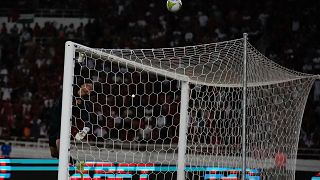
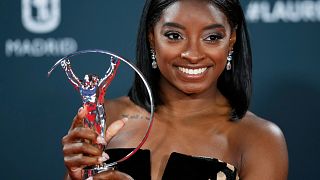
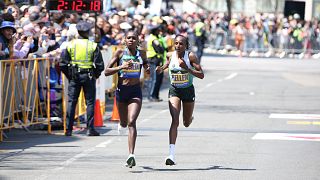
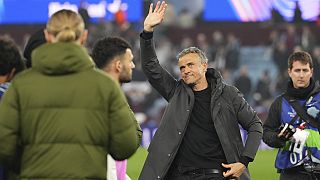
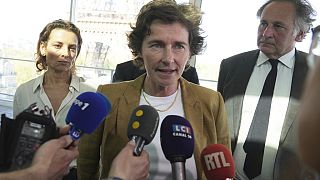




00:53
Algeria expels over 1,800 migrants to Niger in mass deportation
Go to video
French diplomats given 48-hour notice to leave Algeria
01:04
Algeria suspends flights to Mali over airspace violations
Go to video
Sahel alliance recalls ambassadors from Algeria over Malian drone downing
00:40
Tebboune and Macron commit to enhancing bilateral cooperation between Algeria and France
01:06
Ghana: Nigerian boxer Gabriel Olanrewagu collapses in ring at Bukom arena